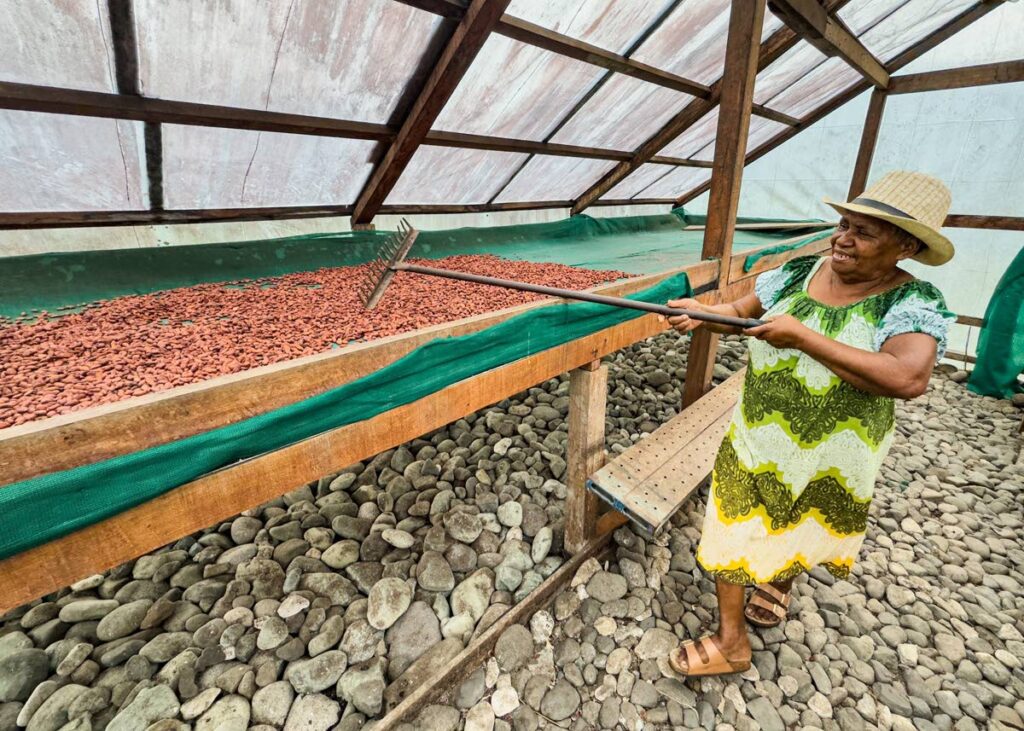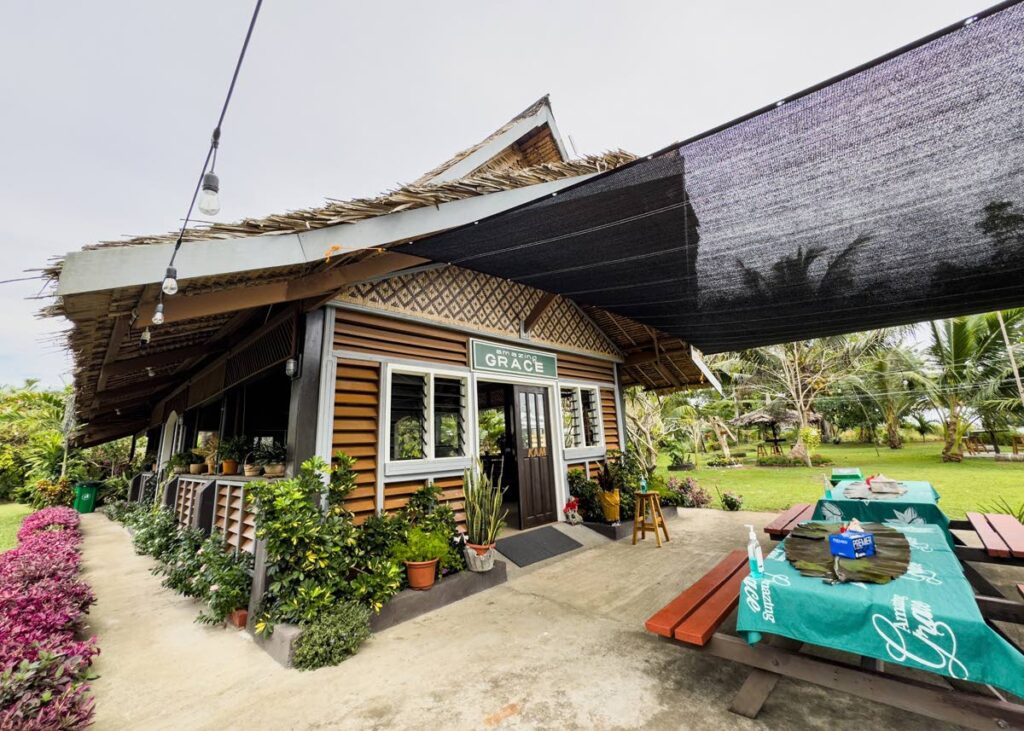Amazing Grace chocolate

Joanne Husain visits a bean to bar chocolate house on the other side of the world.
On the eve of Solomon Islands 46th Independence day (July 7), we set out early from our hotel in the capital of Honiara on a sunny Saturday morning. Roadside and seaside markets are already brimming with vendors and vibrant energy. The air is alive with excited chatter as people proudly display national colours, and flags adorn cars and buildings in preparation for the multi-island nation’s Independence Day parade.
As we journey eastward to our destination – the Amazing Grace Boutique Cocoa Farm – the lively scenes of Honiara quickly give way to humble wooden and thatched structures among lush greenery.
Turning south off the main road means embarking on a rugged mountain ascent. Instead we turn north onto a flat dirt road that eventually leads to Tenaru Beach. As we make the left turn a heap of cocoa beans outside a wooden house sends its chocolatey aroma swirling in the wind. Cocoa trees line the quiet rural road. After a few more minutes of driving, we alight at a small footbridge. A diminutive figure emerges from the cocoa brandishing a machete and a warm smile, greeting us in pidgin “Welkam to Amazing Grace.”
Grace Fekau owns and operates Amazing Grace Boutique Cocoa Farm located at Tenaru on the island of Guadalcanal in the Solomon Islands. She ushers us to a small clearing to begin the farm tour and we exchange introductions. It is immediately apparent that her tiny stature and almost 80 years of age do not diminish her courage or strength. Under the shade of coconut palms, we tramp through neat rows of cocoa trees with banana leaves composted around their roots. She pulls aside a branch, carefully raising her machete to deftly cut open a fat yellow pod.
Cocoa people
Grace offers us the fruit, “You are from Trinidad and Tobago, you are cocoa people!” We savour the familiar white pulp as we continue our tour.
The farm is only a hectare, and like most small cocoa growers across the globe, Grace raises other crops. Bananas, citrus, breadfruit, pineapples, cassava, taro (dasheen) are in the garden surrounding the fermentation and drying areas.
“Almost every tree you see I planted over the 40 years I have lived here.”
Her farm was once land that belonged to Levers Pacific Plantations. Grace’s husband, an employee of Levers, was able to acquire the land when the company surrendered their holdings. The property became their home, and little by little, Grace began to transform the former coconut plantation.
Subsistence farming is the predominant occupation of rural Solomon Islanders, with 80 per cent of the population relying on agriculture for household consumption and to supplement income through the sale of surplus produce.
As a housewife, Grace replants the land not just for food, but also for beautification. The property is lush with flowering shrubs and trees. However, it was only after her husband’s death in 2000 that her cocoa odyssey began: “I am not an agriculture woman or educated woman, but I grow cocoa to support my children and grandchildren.”
By 2006, and already in her 60s, Grace was tending 600 cocoa trees. Friends, family members, and local women from the village shared her vision.
Solomon Islands small farms
Cocoa is a vital crop for the Solomon Islands' economy, with over 24,000 smallholder farmers supporting approximately 133,000 family members. This means that around 26 per cent of its population are involved in cocoa production. The most common variety is Amelonado, a type derived from Forastero. While Forastero has historically not been classified as fine-flavour cocoa, when cultivated in the Pacific's distinct growing conditions – vastly different from those in South and Central America – it has captivated chocolate makers with its unique and intriguing flavour profile.

Cocoa production benefits from good soil and climate. The island of Guadalcanal, with its mineral-rich volcanic soil and equatorial climate has ideal conditions. In the Solomons, other islands with notable cocoa production are Malaita and Makira, where Grace is originally from.
After Grace shows us the fermenting boxes, we enter the solar dryer – a simple wooden frame structure with a clear plastic roof and walls containing sectioned drying tables. Heat builds in the black stone floor during the day and slowly releases at night. We help turn the beans to ensure they dry evenly.
Strongim Bisnis, an investment programme by Australian Aid, continues to revolutionise the cocoa industry in the Solomon Islands through upskilling, with a focus on developing value-added cocoa products and plays a significant role in Grace’s knowledge of cocoa production and processing. Through the programme, she has formed linkages with cocoa experts and chocolatiers in the South Pacific and beyond.
We retrace our steps through the garden and the cocoa trees before driving to our next and final stop on the cocoa tour – a traditional leaf hut on the Tenaru beachfront. We have a refreshing drink of coconut water, while Grace demonstrates how she roasts and creates her cocoa products. Everything is manual, but it is an ethical and organic process: tending, picking, fermenting, drying, roasting, pounding, and visitors can participate in every stage of chocolate-making. We happily enjoyed 100 per cent dark chocolate. It is deep, earthy, healthy, and satisfying.
Amazing Grace has pioneered an agritourism experience incorporating Solomon Islands culture and cuisine, especially that of Grace’s native islands Makira, since 2023. The business is leading the way with value-added products, namely cocoa nibs and 100 per cent hand-pounded untempered chocolate, perfect for baking and making chocolate drinks.
This comes at a pivotal moment for the Solomon Islands' cocoa sector, as they steadily shift from supplying low-priced bulk cocoa beans to focus on high-value boutique markets with quality products like chocolate, cocoa powder, and cocoa nibs for domestic and international markets.
The immersive and innovative tours at Amazing Grace Boutique Cocoa Farm are attended by locals and visitors who happily purchase the chocolate. Grace is an inspiration for entrepreneurs and anyone who wants to make chocolate on any island in the world!

Comments
"Amazing Grace chocolate"